 |

For further information, contact the MBL Communications Office at (508) 289-7423 or e-mail us at comm@mbl.edu
For Immediate Release: December 10, 2009
Contact: Gina Hebert, MBL, 508-289-7725; ghebert@mbl.edu
Brown-MBL Graduate Students Receive Ph.D. as Program Celebrates Fifth Anniversary
 |
 |
 |
Photos:
Click on thumbnails for high-resolution images.
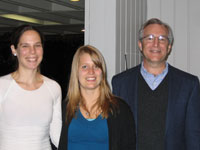
(L to R) Erica Lasek-Nesselquist, Gillian Galford, and Chief Academic and Scientific Officer Joshua Hamilton. Erica and Gillian have completed their Ph.D.s through the Brown-MBL Graduate Program in Biological and Environmental Sciences. Photo by Carolyn Johnson.
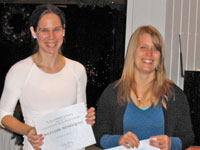
Erica Lasek-Nesselquist (L) received the Crane Family Global Infectious Disease Fellowship to support her final year of thesis research. Gillian Galford received the Stanley Watson Fellowship to support her final year of thesis research. Photo by Carolyn Johnson.
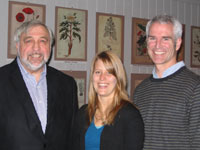
Gillian Galford with her co-mentors Jerry Melillo (L), senior scientist in the MBL's Ecosystems Center, and Jack Mustard, Brown University associate professor of geological sciences. Photo by Carolyn Johnson.
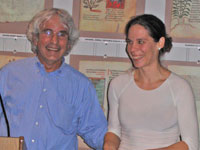
Erica Lasek-Nesselquist with her co-mentor Mitchell Sogin, director of the MBL's Bay Paul Center. Not shown: Erica's co-mentor David Rand, Brown University professor of biology. Photo by Carolyn Johnson.
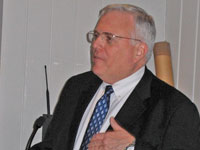
Clyde Briant, Brown University Vice President for Research. Photo by Carolyn Johnson.
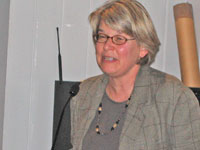
Sheila Bonde, Brown University Dean of the Graduate School. Photo by Carolyn Johnson.
|
MBL, WOODS HOLE, MA—The MBL is pleased to announce that Brown-MBL graduate students Erica Lasek-Nesselquist and Gillian Galford have just completed their doctoral degrees. The students are the first graduates of the Brown-MBL Graduate Program in Biological and Environmental Sciences to have entered the program at its inception in 2004 as new students.
The Brown-MBL Graduate Program in Biological and Environmental Sciences unites the MBL’s and Brown University’s combined research and education expertise in biology, biomedicine, and environmental sciences and offers talented graduate students the chance to work collaboratively on interdisciplinary projects with scientists at both institutions. There are currently 20 students enrolled in the joint program, with five in residence at the MBL. Twenty MBL scientists currently hold joint faculty appointments at Brown, while four Brown faculty members have MBL appointments.
Lasek-Nesselquist’s doctoral research examined the population genetics of Giardia duodenalis, one of the most common human parasites worldwide. Working with David Rand, professor of Biology at Brown, and Mitchell Sogin, director of the MBL’s Bay Paul Center for Comparative Molecular Biology and Evolution, Lasek-Nesselquist studied the relationships among Giardia populations, the prevalence and distribution of Giardia in different environments, the transmission of Giardia between different host species, and the contributions of human activity in making this a reemerging infectious disease.
Lasek-Nesselquist defended her doctoral thesis titled “Comparative Genomics and Population Biology of Giardia duodenalis Assemblages" on September 28. Her final year of doctoral research was supported by the Crane Family Global Infectious Disease Fellowship, which supports graduate and postdoctoral students working in the area of global infectious disease. She will begin postdoctoral research this month at Harvard University, working with professor Matthew Meselson who also has an adjunct appointment in the MBL’s Bay Paul Center.
Galford’s doctoral research focused on the use of remote sensing and modeling as tools to understand the relationship between land-use changes and ecosystems services, and scenarios for sustainable development in a region of Southwestern Brazil. She worked with Brown associate professor of Geological Sciences Jack Mustard and MBL Ecosystems Center senior scientist Jerry Melillo to understand major historical and future patterns of land-cover and land-use change in the agricultural frontier of the Brazilian Amazon and the impacts on biogeochemistry, particularly greenhouse gas emissions from deforestation and agriculture.
Galford defended her doctoral thesis titled "Biogeochemical Consequences of Land-Cover and Land-Use Change in the Agricultural Frontier of the Brazilian Amazon" on November 24. She will begin a post-doctoral fellowship at the Earth Institute at Columbia University in January, 2010 where she will be studying the biogeochemical impacts of agricultural intensification in Sub-Saharan Africa, applying the tools developed in her dissertation work to issues of food scarcity and adaptation to future climate change.
While completing her Ph.D., Galford was the recipient of the inaugural Stanley Watson Fellowship, which provides support for graduate students carrying out dissertation research with an MBL scientist or support for graduate or post-doctoral students enrolled in one of the advanced MBL courses.
“The MBL congratulates Gillian and Erica on their accomplishments,” said MBL Chief Academic and Scientific Officer Joshua Hamilton. “One of the most significant events in the MBL’s recent history is the creation of the joint Ph.D. program with Brown University. We are proud of this affiliation, which is the perfect marriage of the complementary strengths of both Brown and the MBL. We look forward to continuing to use the expertise of both institutions to educate and train the next generation of scientists.”
“Pioneers need to have vision and a spirit of discovery,” said Sheila Bonde, dean of Brown University’s Graduate School. “These two students ably met the challenges of the interdisciplinary training and research opportunities afforded by this Brown-MBL program. We congratulate them and thank them for contributing to the richness of our intellectual community.”
“The Brown-MBL graduate program has initiated a great research and educational collaboration between the two institutions which continues to grow,” added Clyde Briant, Brown University’s vice president for research. “Congratulations to these two graduates who have played an important role in establishing this program.”
The MBL is a leading international, independent, nonprofit institution dedicated to discovery and to improving the human condition through creative research and education in the biological, biomedical and environmental sciences. Founded in 1888 as the Marine Biological Laboratory, the MBL is the oldest private marine laboratory in the Americas. For more information, visit www.MBL.edu.
|